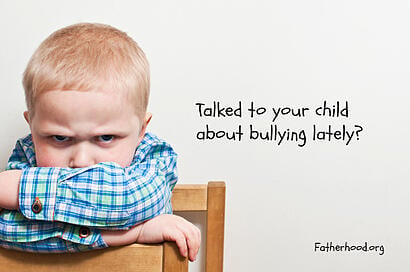4 Great Resources on How to Deal with Bullies
1 min read
Date Published: 10/10/2013
Last Updated: 08/11/2022
National Fatherhood Initiative Blog / Latest Articles
1 min read
The following is a post from Christopher A. Brown, Executive Vice President of National Fatherhood Initiative (NFI).
Bullying continues to receive a lot of attention in schools and the media, and for a good reason.

It takes many forms ranging from traditional, physical bullying to the more recent and harder-to-spot form called “cyberbullying”. Regardless of form or medium, it can devastate its victims and has led some children to kill themselves. It might surprise you to learn, however, that children who bully aren’t necessarily the mean kids who tower in height over everyone else and lie in wait for your child to walk by and steal his or her lunch money through sheer intimidation.
According to Child Trends’ 5 Things to Know about Kids Who Bully, bullies:
The latter point is particularly relevant to our work at National Fatherhood Initiative.
According to Child Trends:
"Children who have less-involved parents are more likely to bully others, as are those who have siblings or parents who model or endorse aggressive behavior. Parenting styles linked to social bullying include those lacking nurturing or that rely on psychological control of children; children with parents who manipulate relationships to assert power or gain attention are also more likely to engage in social bullying.”
If you’re wondering whether your child is a victim of bullying or know that your child is a victim and need some guidance in how to help your child, check out these four great resources that provide definitions of and data on bullying, as well as, advice on how to deal with bullies.
When was the last time you talked with your child about bullying?
Date Published: 10/10/2013
Last Updated: 08/11/2022
Download this free guide for a proven 7-step roadmap—from making the case and securing funding for your program, to launching and measuring real results!


Train Your Staff
Fatherhood Programs
Fatherhood Data
© 2026 National Fatherhood Initiative®. All rights reserved.